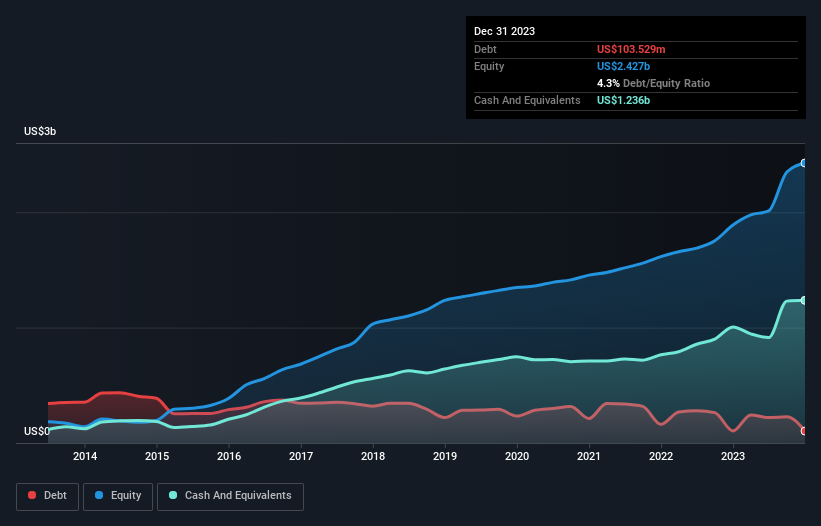- United States
- /
- Semiconductors
- /
- NasdaqGS:TSEM
Tower Semiconductor (NASDAQ:TSEM) Seems To Use Debt Quite Sensibly

Warren Buffett famously said, 'Volatility is far from synonymous with risk.' It's only natural to consider a company's balance sheet when you examine how risky it is, since debt is often involved when a business collapses. Importantly, Tower Semiconductor Ltd. (NASDAQ:TSEM) does carry debt. But should shareholders be worried about its use of debt?
What Risk Does Debt Bring?
Generally speaking, debt only becomes a real problem when a company can't easily pay it off, either by raising capital or with its own cash flow. Ultimately, if the company can't fulfill its legal obligations to repay debt, shareholders could walk away with nothing. However, a more common (but still painful) scenario is that it has to raise new equity capital at a low price, thus permanently diluting shareholders. By replacing dilution, though, debt can be an extremely good tool for businesses that need capital to invest in growth at high rates of return. The first thing to do when considering how much debt a business uses is to look at its cash and debt together.
View our latest analysis for Tower Semiconductor
What Is Tower Semiconductor's Net Debt?
As you can see below, Tower Semiconductor had US$103.5m of debt, at December 2023, which is about the same as the year before. You can click the chart for greater detail. However, it does have US$1.24b in cash offsetting this, leading to net cash of US$1.13b.

A Look At Tower Semiconductor's Liabilities
We can see from the most recent balance sheet that Tower Semiconductor had liabilities of US$276.8m falling due within a year, and liabilities of US$214.6m due beyond that. On the other hand, it had cash of US$1.24b and US$178.9m worth of receivables due within a year. So it can boast US$923.9m more liquid assets than total liabilities.
This excess liquidity suggests that Tower Semiconductor is taking a careful approach to debt. Because it has plenty of assets, it is unlikely to have trouble with its lenders. Simply put, the fact that Tower Semiconductor has more cash than debt is arguably a good indication that it can manage its debt safely.
It is just as well that Tower Semiconductor's load is not too heavy, because its EBIT was down 33% over the last year. Falling earnings (if the trend continues) could eventually make even modest debt quite risky. When analysing debt levels, the balance sheet is the obvious place to start. But it is future earnings, more than anything, that will determine Tower Semiconductor's ability to maintain a healthy balance sheet going forward. So if you want to see what the professionals think, you might find this free report on analyst profit forecasts to be interesting.
Finally, a business needs free cash flow to pay off debt; accounting profits just don't cut it. Tower Semiconductor may have net cash on the balance sheet, but it is still interesting to look at how well the business converts its earnings before interest and tax (EBIT) to free cash flow, because that will influence both its need for, and its capacity to manage debt. During the last three years, Tower Semiconductor produced sturdy free cash flow equating to 75% of its EBIT, about what we'd expect. This cold hard cash means it can reduce its debt when it wants to.
Summing Up
While it is always sensible to investigate a company's debt, in this case Tower Semiconductor has US$1.13b in net cash and a decent-looking balance sheet. The cherry on top was that in converted 75% of that EBIT to free cash flow, bringing in US$232m. So is Tower Semiconductor's debt a risk? It doesn't seem so to us. When analysing debt levels, the balance sheet is the obvious place to start. However, not all investment risk resides within the balance sheet - far from it. We've identified 2 warning signs with Tower Semiconductor , and understanding them should be part of your investment process.
At the end of the day, it's often better to focus on companies that are free from net debt. You can access our special list of such companies (all with a track record of profit growth). It's free.
If you're looking to trade Tower Semiconductor, open an account with the lowest-cost platform trusted by professionals, Interactive Brokers.
With clients in over 200 countries and territories, and access to 160 markets, IBKR lets you trade stocks, options, futures, forex, bonds and funds from a single integrated account.
Enjoy no hidden fees, no account minimums, and FX conversion rates as low as 0.03%, far better than what most brokers offer.
Sponsored ContentValuation is complex, but we're here to simplify it.
Discover if Tower Semiconductor might be undervalued or overvalued with our detailed analysis, featuring fair value estimates, potential risks, dividends, insider trades, and its financial condition.
Access Free AnalysisHave feedback on this article? Concerned about the content? Get in touch with us directly. Alternatively, email editorial-team (at) simplywallst.com.
This article by Simply Wall St is general in nature. We provide commentary based on historical data and analyst forecasts only using an unbiased methodology and our articles are not intended to be financial advice. It does not constitute a recommendation to buy or sell any stock, and does not take account of your objectives, or your financial situation. We aim to bring you long-term focused analysis driven by fundamental data. Note that our analysis may not factor in the latest price-sensitive company announcements or qualitative material. Simply Wall St has no position in any stocks mentioned.
About NasdaqGS:TSEM
Tower Semiconductor
An independent semiconductor foundry, provides technology, development and process platforms for integrated circuits in the United States, Japan, Asia, and Europe.
Flawless balance sheet and good value.
Similar Companies
Market Insights
Community Narratives


